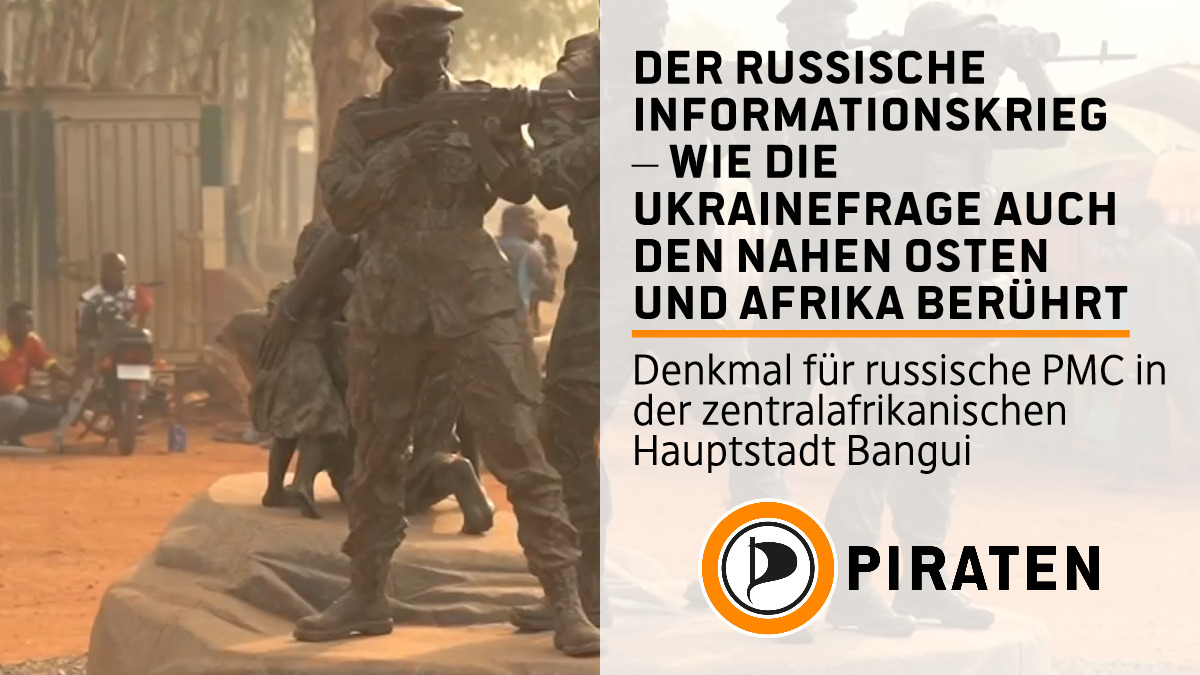
In Europe and also in North America, Russia is losing the information war to influence public opinion, except for a few actors who are ideologically firmly on Russia’s side, such as parts of the AfD and the Left, but also the SPD in Germany.[1] Meanwhile, the German “peace movement”[2] is also divided along generational lines on this issue.[3] In Europe, therefore, it looks bad for the time being that Russian propaganda can catch on. However, the situation is different in other parts of the world. In India, for example, Russia is winning the information war.[4]
On the African continent and in the Middle East, on the other hand, Moscow’s propaganda tends to fall on fertile ground. In Mali, where France is working hard to maintain its influence, Moscow has gained influence since the coup this year.[5]
For Moscow, gaining new allies is important, while Russia’s traditional influence in Europe may decline in the short to medium term due to the consequences of its invasion of Ukraine. European states and the United States have a more negative reputation on the African continent, as well as in large parts of the Middle East, in contrast to Russia. An important exception here is certainly the (cultural) region in and around Iran, where Russia faces stronger opposition.[6]
For Russia, it is also an opportunity to then influence the politics and societies of European states again via these countries and their emigrant communities in Western states. A similar approach has already been seen in the war in Syria.[7]
Meanwhile, the Russian broadcaster RT, which is one of the most important building blocks of Russian hybrid and information warfare, is also adjusting its information warfare tactics due to its poor performance on the Western information battlefield so far. For example, RT chief Ms. Margarita Simonyan has announced that she is looking for fighters for a “people’s information militia.” In this militia, citizens of other states are to receive propaganda material directly from RT and distribute it independently. RT offers this “service” for 15 languages so far. Ms. Simonyan announced plans to increase it to 35 languages. Thus, Russia’s hybrid and information warfare is clearly entering a new phase.[8]
The basic elements of Russian information warfare in Africa, as well as the Middle East, are similar to the previous approach in Europe. However, Russian propaganda is adapted to the regional, cultural target groups. In the face of local distrust of the “West” – above all the United States, but also the former colonial powers of France and Great Britain – Russia wants to promote itself here as an alternative great power to the population, but also to a new generation (not only on the African continent) of local power elites.[9]
One can clearly see a continuity here with the Soviet Union’s actions in Africa at the time of the Cold War.[10] Russia also finds an ideal environment for its information warfare today due to the USSR’s historical cooperation with many African states.[11]
Overall, Russia’s information war aims to have a lasting impact. In doing so, Russia focuses primarily on India, China, and states in Africa and South Asia.[12] The public in the Middle East, in contrast to the governments, tends to sympathize with Russia. For example, the public there accuses the EU of racism, since in contrast to people from the Middle East, fleeing Ukrainians could more easily find refuge in EU states.[13]
In terms of content and target groups, Russia’s information war still follows the approach inherited from the Soviet Union. The goal is still to discredit democracy and “the West” globally, but also in individual states. This is also attempted in the West itself via the right-wing populist parties and groups; for this, see the Rassemblement National, in which Marine Le Pen withdrew a leaflet with a picture of a meeting with Putin shortly before the election.
Likewise, resilience and space for freedom are to be corroded. Russia’s elites (the Siloviki) need a (global) environment of mistrust and fear to successfully implement their goals. George Orwell had already depicted this well in his novel “1984” based on his experiences with Stalinism.
Today, thanks to new technologies, the Russian information war with the same target groups and goals can again be analyzed in a more global and targeted way. Today, as then, it is directed against every democracy.
In addition, there is a trivialization of Moscow’s actions, also from Cold War thinking, also present in the West, which is associated with “liberation movements” for historical reasons. Actors include not only classically “left-wing” groups, but also people influenced by the “new social movements” or (alleged) activists; but also reactionary and right-wing populist groups that see Putin-Russia’s authoritarian fascism as a role model and ally.
For example, at the 2019 Munich Security Conference (MSC), then-Chancellor Angela Merkel warned of the danger of instrumentalizing “Fridays for Future (FFF)” through hybrid warfare.[14]
The Russian strategy of division can therefore be found on all continents, which together globally are supposed to act as building blocks altogether in the Putin-Russia sense against democracy and the West. Not for nothing is the conflict with the West for Moscow’s thinking the decisive point in its war of aggression against Ukraine. This thinking can therefore also be found in Russia’s current information war.
[1] 27. February 2022 WDR: AfD and „Die Linke“ – Propaganda aid for Putin.
https://www1.wdr.de/nachrichten/landespolitik/Propagandahilfe-fuer-Russland-AfD-Linke-100.html
[2]For criticism of the German “peace movement” on the Russia question, see the contributions from the profile: „Robert Treichler: Der Irrtum der Pazifisten“, 23. April 2022
https://www.profil.at/meinung/robert-treichler-der-irrtum-der-pazifisten/401983433
and 20. February 2022 TAZ: Peace Movements and Ukraine: No Solidarity, Anywhere
https://taz.de/Friedensbewegungen-und-die-Ukraine/!5836365/
Also recommended: the article by Borys Sobieski entitled “Never again?” in the April 19, 2022 issue of the “Flaschenpost” (in german) : https://flaschenpost.piratenpartei.de/2022/04/19/nie-wieder/
[3] Kempf, Wilhelm: On the Social Psychology of the Peace Movement, in: „Zeitschrift für Sozialpsychologie und Gruppendynamik“ 9 (1984), 1, S. 26-37, https://kops.uni-konstanz.de/bitstream/handle/123456789/11011/Zur_Sozialpsychologie_der_Friedensbewegung.pdf
& Sascha Lobo: The German rag pacifism in “Der SPIEGEL”, 20 April 2022
[4] 16. April 2022 NZZ: #IStandWithRussia: In India, Russia wins the information war.
https://www.nzz.ch/international/ukraine-krieg-in-indien-gewinnt-russland-den-informationskrieg-ld.1677539?utm_source=pocket-newtab-global-de-DE
[5] Adeoye, Aanu: Russia’s presence in Mali raises concerns, on: Chatham House 14. December 2021
https://www.chathamhouse.org/2021/12/russias-presence-mali-raises-concerns
& Apps, Peter:“With arms and Facebook, Russia is entrenched in Mali -T he struggle for influence in sub-Saharan Africa between Paris and Moscow is not new but it has been escalating since at least 2017.” auf: The Arab Weekly, 23. April 2022
https://thearabweekly.com/arms-and-facebook-russia-entrenched-mali
[6] Davoodi, Schoresch: Will Iran change politically in the near future? – WG Foreign Policy of the Pirate Party Germany 2021https://aussenpolitik.piratenpartei.de/2021/05/02/wird-sich-der-iran-in-der-nahen-zukunft-politisch-veraendern-der-versuch-einer-prognose/
[7] 18. August 2020 Davoodi, Schoresch: Germany and the “Refugee Crisis” – A Challenge for Security Policy Action, in: Inner-party education Group of the Pirate Party, Germany.
https://bildung.piratenpartei.de/2020/08/18/deutschland-und-die-fluechtlingskrise-eine-herausforderung-fuer-sicherheitspolitisches-handeln/
[8] 23. April 2022:
https://twitter.com/THesmert/status/1517646722549358592?s=20&t=sfif0v_8XbzevHAGV0EYhw
[9] Web.de 6. April 2022: Illner, Marie: Russia in Africa: How the Kremlin fuels anti-Western sentiment.
https://web.de/magazine/politik/russland-krieg-ukraine/russland-afrika-kreml-antiwestliche-stimmung-anheizt-36778632
[10] DW 6. November 2017: How Russia’s Revolution Shaped Africa’s History.
https://www.dw.com/de/wie-russlands-revolution-afrikas-geschichte-pr%C3%A4gte/a-41231093
[11] FAZ 4. March 2022: Bröll. Claudia & Meier, Christian – “War on Ukraine – Russia’s Allies in Africa.”.
https://www.faz.net/aktuell/politik/ausland/ukraine-krieg-warum-russland-verbuendete-in-afrika-hat-17848689.html
[12] 3. April 2022: The Times of Israel: Ukraine has upper hand in information war, but Russia eyes a long game.
https://www.timesofisrael.com/ukraine-has-upper-hand-in-infowar-battle-but-russia-eyes-a-long-game/
[13] 24. March 2022: Carnegie Endowment for International Peace : What the Russian War in Ukraine Means for the Middle East.
https://carnegieendowment.org/2022/03/24/what-russian-war-in-ukraine-means-for-middle-east-pub-86711
[14] DLF 19. February 2019: Merkel irritates with remarks on climate strikes.
https://www.deutschlandfunk.de/aeussere-einfluesse-merkel-irritiert-mit-aeusserungen-ueber-100.html

0 comments on “The Russian Information War – How the Ukraine Question Also Affects the Middle East and Africa”